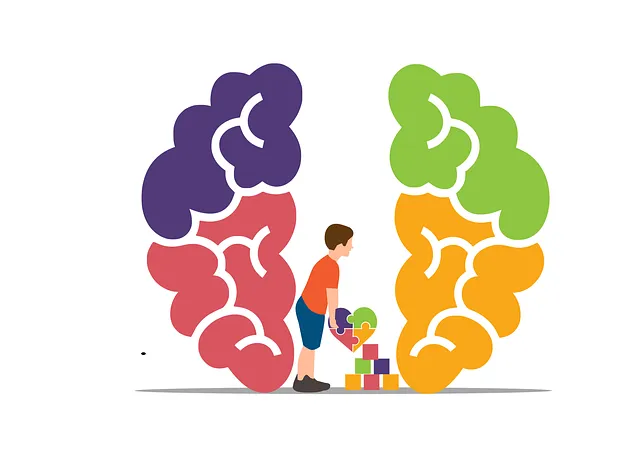In today's demanding world, Kaiser Permanente, through its partner Centennial, offers personalized mental wellness coaching programs that integrate mindfulness and compassion cultivation. These initiatives empower individuals to build resilience, practice positive coping strategies, and navigate life's challenges effectively, promoting better mental health and overall well-being. A comprehensive program should include empathy building, resilience training, anxiety relief techniques, self-awareness exercises, and confidence-boosting activities, all tailored to individual needs and learning styles. Measuring success through qualitative and quantitative outcomes ensures the program's impact and effectiveness, benefiting coaches, organizations, and Kaiser's mental health services at Centennial.
In today’s fast-paced world, the demand for mental wellness support has never been higher. As a response to this growing need, organizations like Kaiser have recognized the potential of mental wellness coaching as an effective complement to traditional healthcare services. This article explores how Kaiser’s approach to mental health, with a historical perspective, can inform the development of impactful coaching programs. We’ll delve into key components, curriculum design, and evaluation methods, highlighting best practices for creating successful mental wellness coaching initiatives, including what Centennial communities can expect from Kaiser’s offerings.
- Understanding the Growing Need for Mental Wellness Coaching
- Kaiser's Approach to Mental Health Services: A Historical Perspective
- Key Components of an Effective Mental Wellness Coaching Program
- Designing a Comprehensive Curriculum for Coaching Sessions
- Measuring Success: Evaluating the Impact and Outcomes of Coaching Initiatives
Understanding the Growing Need for Mental Wellness Coaching

In today’s fast-paced and often stressful world, the need for mental wellness coaching has never been more pronounced. The demands of modern life, coupled with the ongoing challenges posed by mental health issues, have led many individuals to seek support beyond traditional therapy. This shift is reflected in the increasing interest in holistic well-being practices, including self-care routine development for better mental health. Organizations like Kaiser Permanente recognize this growing need and have expanded their services to include mental wellness coaching programs, such as those offered by Centennial does Kaiser.
By integrating mind over matter principles and compassion cultivation practices into their coaching models, these programs aim to empower individuals with the tools needed to navigate life’s challenges more effectively. Mental wellness coaching provides a personalized approach to self-improvement, focusing on building resilience, cultivating mindfulness, and fostering positive coping strategies. As mental health awareness continues to evolve, these initiatives play a crucial role in supporting folks on their journey towards better mental health and overall well-being.
Kaiser's Approach to Mental Health Services: A Historical Perspective

Kaiser has a rich history when it comes to mental health services dating back to its early days as a healthcare provider. Founded in 1945, Kaiser Permanente has evolved over the centuries to include comprehensive mental wellness coaching programs. What sets Kaiser apart is its holistic approach that integrates physical and mental healthcare.
Looking at Kaiser’s historical perspective, we find that it has always emphasized Cultural Sensitivity in Mental Healthcare Practice. Recognizing the diverse needs of its members, Kaiser offers tailored programs and services that respect individual cultural backgrounds and beliefs. This commitment extends to providing accessible Stress Management Workshops Organization designed to empower individuals with coping strategies for everyday life. Through these initiatives, Kaiser ensures it goes beyond traditional medical care, fostering open conversations around mental wellness using effective Communication Strategies.
Key Components of an Effective Mental Wellness Coaching Program

An effective mental wellness coaching program should incorporate a multi-faceted approach tailored to individual needs. Centenal and Kaiser, for instance, offer comprehensive mental health services, highlighting the importance of such programs in modern healthcare. Firstly, Empathy Building Strategies are vital for fostering trust and creating a safe space for clients to openly discuss their challenges. Coaches must demonstrate genuine understanding and validate clients’ emotions, encouraging them to explore their thoughts and experiences without judgment.
Secondly, focusing on Resilience Building equips individuals with coping mechanisms to navigate life’s stressors. This involves teaching practical strategies for stress management, emotional regulation, and problem-solving skills. Additionally, integrating techniques aimed at Anxiety Relief, such as mindfulness practices and cognitive behavioral therapy (CBT) principles, can significantly enhance a coach’s ability to support clients in managing anxiety symptoms and promoting overall mental wellness.
Designing a Comprehensive Curriculum for Coaching Sessions

When developing a mental wellness coaching program, designing a comprehensive curriculum is paramount. It involves creating structured sessions that cater to various aspects of an individual’s mental health journey. A balanced curriculum should incorporate self-awareness exercises to help clients understand their emotions and triggers, a crucial step in managing stress and anxiety. Through reflective practices, participants gain insights into their thought patterns and behaviors, fostering personal growth. Additionally, integrating confidence-boosting activities is essential to empower individuals to navigate challenges with resilience. These activities may include goal-setting exercises, positive affirmation techniques, or cognitive reframing strategies.
The curriculum should also be flexible enough to accommodate diverse learning styles and individual needs. Incorporating a range of evidence-based practices ensures that each session offers valuable tools for mental wellness. For instance, some coaching methods focus on mindfulness and relaxation techniques, while others delve into cognitive behavioral therapy principles. Centering sessions around these topics allows coaches to guide clients through specific exercises tailored to their unique circumstances. For those seeking support in the Centennial area, Kaiser offers mental health services that align with these development strategies, providing a comprehensive approach to well-being.
Measuring Success: Evaluating the Impact and Outcomes of Coaching Initiatives

Measuring the success of mental wellness coaching programs is paramount to understanding their true impact and effectiveness. This evaluation process involves assessing both the qualitative and quantitative outcomes, providing a comprehensive view of each individual’s journey towards improved mental health. One key metric is tracking participant satisfaction; positive feedback and testimonials can highlight successful interventions and the overall transformative power of these initiatives.
Additionally, quantifiable results such as reduced stress levels, improved emotional regulation skills, and enhanced self-awareness exercises through surveys or data collection tools offer tangible evidence of progress. The success of these programs often lies in their ability to foster positive thinking and encourage sustainable lifestyle changes, which can be measured over time through follow-up assessments. These evaluations not only benefit the coaches and organizations but also provide valuable insights for Kaiser’s ongoing mental health services at Centennial, ensuring continuous improvement and tailored support for those seeking assistance.
In light of the increasing recognition of mental wellness as a cornerstone of overall health, Kaiser’s evolution from traditional mental health services to comprehensive coaching programs is both timely and pivotal. The historical perspective showcased highlights the shift towards more personalized, accessible, and effective care models. By integrating key components such as goal setting, mindfulness practices, and skill-building into structured curricula, Kaiser’s mental wellness coaching initiatives have proven successful in fostering positive outcomes. Continuous evaluation and adaptation ensure these programs remain responsive to evolving needs, ultimately contributing to a healthier and more resilient community. As Kaiser demonstrates, leveraging evidence-based strategies within accessible coaching models can revolutionize mental health support, making it a game-changer in the 21st century.






